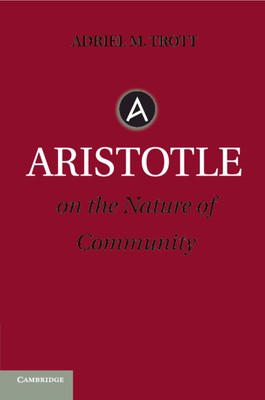
- We will send in 10–14 business days.
- Author: Adriel M Trott
- Publisher: Cambridge University Press
- ISBN-10: 1316625494
- ISBN-13: 9781316625491
- Format: 15.2 x 22.9 x 1.4 cm, softcover
- Language: English
- SAVE -10% with code: EXTRA
Reviews
Description
This reading of Aristotle's Politics builds on the insight that the history of political philosophy is a series of configurations of nature and reason. Aristotle's conceptualization of nature is unique because it is not opposed to or subordinated to reason. Adriel M. Trott uses Aristotle's definition of nature as an internal source of movement to argue that he viewed community as something that arises from the activity that forms it rather than being a form imposed on individuals. Using these definitions, Trott develops readings of Aristotle's four arguments for the naturalness of the polis, interprets deliberation and the constitution in Politics as the form and final causes of the polis, and reconsiders Aristotle's treatment of slaves and women. Trott then argues that Aristotle is relevant for contemporary efforts to improve and encourage genuine democratic practices.
EXTRA 10 % discount with code: EXTRA
The promotion ends in 11d.12:12:49
The discount code is valid when purchasing from 10 €. Discounts do not stack.
- Author: Adriel M Trott
- Publisher: Cambridge University Press
- ISBN-10: 1316625494
- ISBN-13: 9781316625491
- Format: 15.2 x 22.9 x 1.4 cm, softcover
- Language: English English
This reading of Aristotle's Politics builds on the insight that the history of political philosophy is a series of configurations of nature and reason. Aristotle's conceptualization of nature is unique because it is not opposed to or subordinated to reason. Adriel M. Trott uses Aristotle's definition of nature as an internal source of movement to argue that he viewed community as something that arises from the activity that forms it rather than being a form imposed on individuals. Using these definitions, Trott develops readings of Aristotle's four arguments for the naturalness of the polis, interprets deliberation and the constitution in Politics as the form and final causes of the polis, and reconsiders Aristotle's treatment of slaves and women. Trott then argues that Aristotle is relevant for contemporary efforts to improve and encourage genuine democratic practices.


Reviews